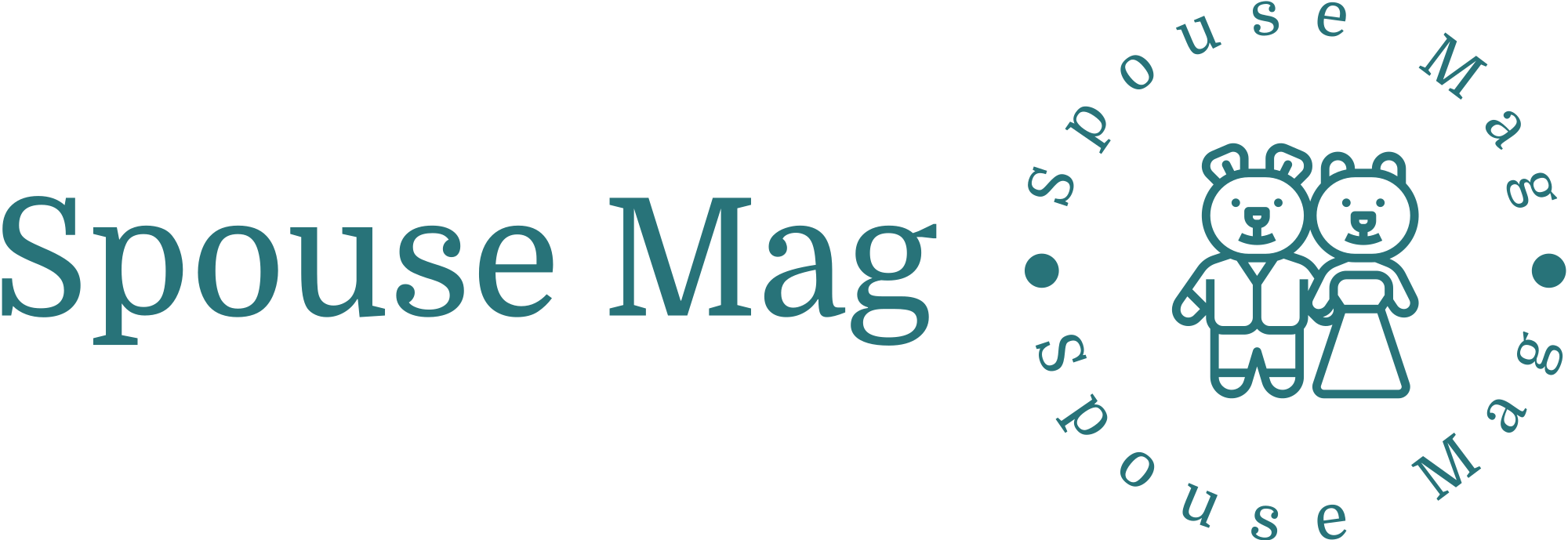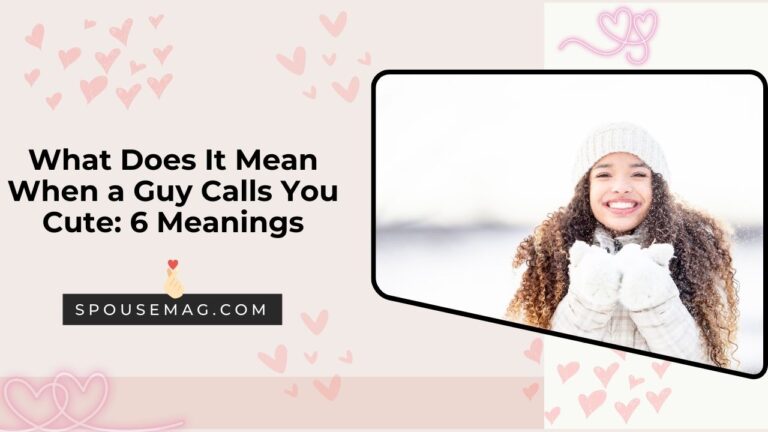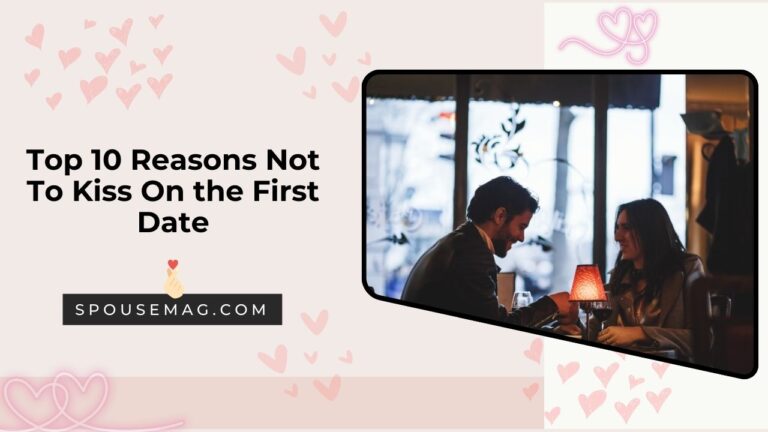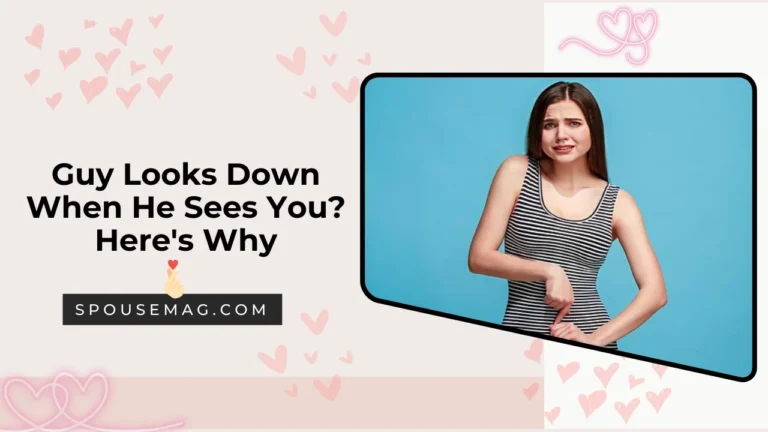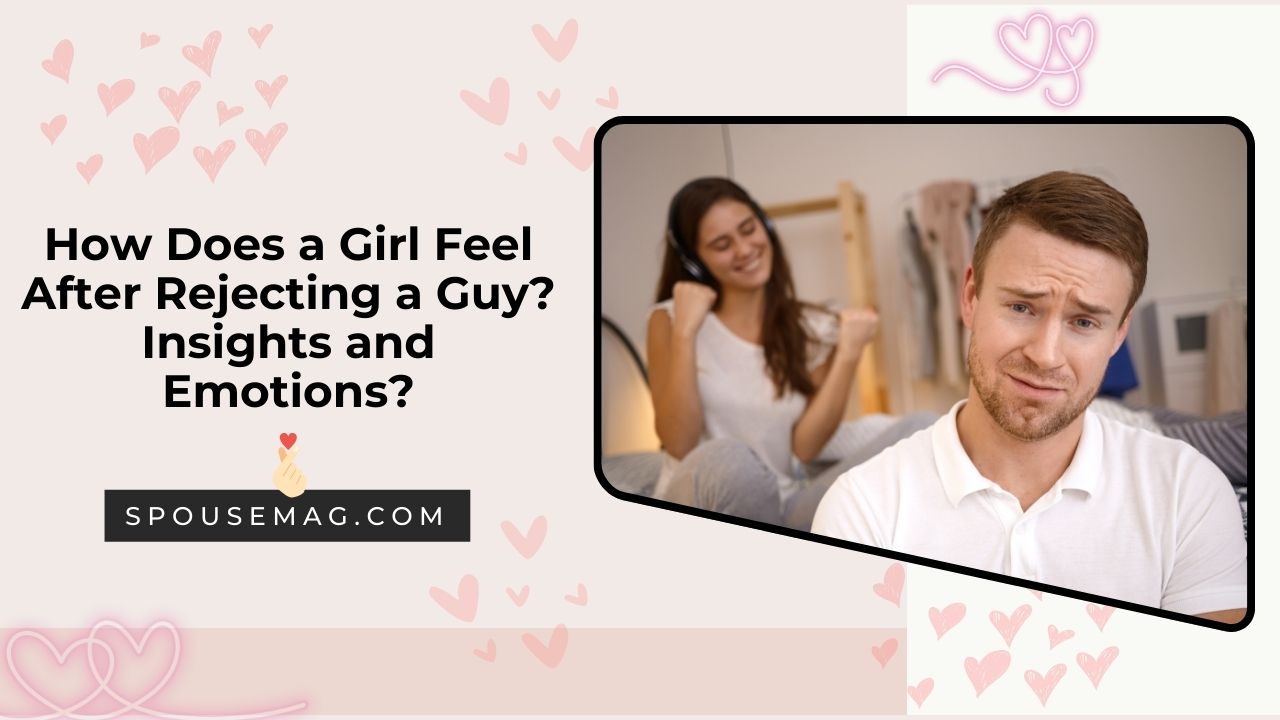
After rejecting a guy, a girl often feels guilt for hurting his feelings, relief if she believes the decision was necessary for her happiness, and sadness if she values him as a friend and if the rejection was difficult for both of them
She also feels empowered for making a choice she believes was right, but uncertain about how the rejection will affect their future interactions.
In some cases, she also experiences emotional numbness as she processes the situation.
In this post, we’ll explore the full range of emotions you feel after rejecting a guy.
1. Guilt
Even if you’re sure about your decision, you still find yourself haunted by the ghost of "What if I’d been nicer?" Wondering if you could’ve sprinkled a bit more sugar on that “no.” This is especially true if the guy is kind and respectful.
My friend Jenna once said, “I felt awful rejecting someone who was genuinely a good person. I found myself over-analyzing every word I said.”
2. Anxiety About Future Interactions
Another common emotion is anxiety about future encounters. If the girl and the guy share social circles and work together, the prospect of facing him again is daunting.
She worries about awkwardness and how her decision will affect their interactions moving forward. This anxiety sometimes leads to avoidance behaviors and a heightened sense of discomfort in shared spaces.
According to a study from the University of Chicago, social avoidance after rejection is a common coping mechanism, but it often just makes the situation more awkward in the long run. So, embrace the awkwardness, it's part of the journey
3. Sense of Empowerment
On the flip side, rejecting someone is empowering. Making a choice that aligns with your values and feelings boosts self-esteem. This sense of empowerment reinforces what you want in a relationship and leads to greater self-confidence and clarity about your needs and boundaries.
When I finally turned down a relationship that wasn’t right for me, I felt like I had a new lease on life. It was a wake-up call about what I wanted.
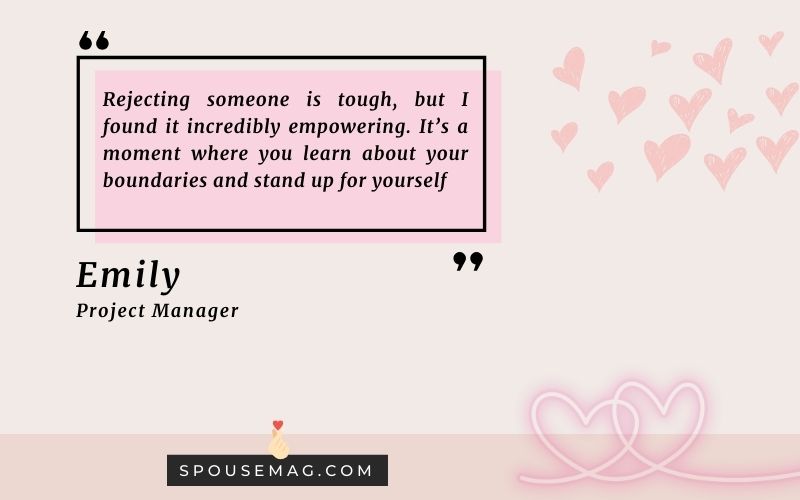
4. Reflection and Growth
After the initial shock wears off, you find yourself doing some serious soul-searching. This is a valuable experience, helping you learn and grow as a person.
You analyze what led to the rejection, what you learned, and how to handle similar situations better in the future. It’s like taking a deep breath and figuring out how to steer your emotional ship through calmer waters.
Sarah, Artist, from New York, said, “I used to think rejection was the end of the world, but now I see it as a chance to learn and grow.”
5. Empathy for the Other Person
Lastly, feeling empathy for the person who was rejected is common. Even if the decision was necessary, you still feel a sense of sympathy or concern for how he is coping with the rejection.
Fun Fact: Did you know that more empathetic people tend to have better emotional health? So, feeling empathy is good.
When I rejected a date once, I found myself worrying about how he was doing for days.
This empathy shows that you're a kind and compassionate human being, which is a pretty awesome quality to have.
6. Self-Doubt
Sometimes, after saying no, a little voice in your head starts whispering doubts: "Did I make the right decision?" "Maybe I was too quick to judge?" This is self-doubt creeping in, and it's pretty common.
Here's the thing: relationships are complex, and sometimes even the clearest rejection triggers self-doubt.
Maybe the guy had hidden qualities you hadn't considered, or you're worried you'll never find someone who clicks. These thoughts are normal, but it's important not to let them take over.
Remember, you said no for a reason. Reflect on why you weren't interested and trust that intuition. Just because you rejected one guy doesn't mean you'll never find love. There are plenty of fish in the sea, as they say!
To add more perspective, I spoke with Rachel, a 27-year-old nurse. She shared, “After I rejected a guy I had been on a few dates with, I started doubting myself almost immediately. Was I being too picky? Did I give him a fair chance? It was hard to shake the feeling that I might have made a mistake.”
Rachel’s experience shows how self-doubt makes you question your judgment, even when you believe you made the right choice.
7. Sadness
Even if rejecting them was the right choice, knowing that you've caused someone emotional distress is deeply upsetting.
Additionally, there is a sense of loss—of the relationship you had, the potential future that won’t happen, and the change in dynamics between you.
It's okay to feel a little sad! Talk to a friend, write in a journal, and allow yourself to feel it for a while.
Remember, you dodged a situation that wouldn't have worked for you. Now you're free to find someone who truly complements you.
"Feeling sadness after rejecting someone reflects your empathy and the value you place on your relationships. It shows that you care deeply about others and understand the emotional impact of your decisions." — Dr. Kristin Neff, psychologist and author on self-compassion.
8. Anger
Here are a few reasons anger shows up:
- The guy you rejected didn't take no for an answer and persisted even after you made your feelings clear.
- The guy's approach to asking you out was disrespectful.
- You've had negative experiences with rejection in the past, and those feelings are bubbling up in this situation.
Dr. Michael Adams, a psychologist in his late 40s, explains, “Anger can be a defense mechanism that masks other, more vulnerable emotions like guilt or sadness. It’s easier to feel angry than to confront the discomfort of having hurt someone or disrupted a relationship.”
Tips for Managing and Processing Emotions After Rejecting Someone
Here's a table that outlines tips for managing and processing emotions after rejecting someone:
| Tip | Description |
|---|---|
| Acknowledge Your Emotions | Recognize and allow yourself to feel a range of emotions, such as guilt, sadness, relief, etc. |
| Reflect on the Situation | Understand your reasons for the decision and learn from the experience. |
| Communicate Honestly | Be honest and clear with the person you rejected, but also with yourself about your feelings. |
| Seek Support | Talk to friends, family, or a therapist to help process your emotions and gain perspective. |
| Practice Self-Care | Engage in activities that promote well-being and help you relax, such as exercise, hobbies, etc. |
| Set Boundaries | Maintain healthy boundaries to give yourself and the other person space to heal. |
| Focus on Personal Growth | Use this experience as an opportunity for self-improvement and emotional development. |
| Be Compassionate with Yourself | Understand that it's okay to feel uncomfortable and that you're doing your best in a tough situation. |
Conclusion
Rejecting someone is an emotionally complex experience that evokes a wide range of feelings, from relief and empowerment to guilt and sadness.
Understanding that these emotions are a normal part of the process helps you navigate the aftermath with more self-compassion.
While the relief of being honest about your feelings is profound, it’s also common to experience guilt, especially if you value the other person and their feelings.
Effective coping strategies, such as talking to a trusted friend, practicing self-care, and setting clear boundaries, help you manage these emotions and foster emotional resilience.

As a married wife, founder, and editor of SpouseMag.com – these guides are based on my own personal experiences, observations, research and insights. I am transparent about being inspired by the life and work of the two greatest experts in the relationship space – Dr. John and Julia Gottman, and Harville and Helen. They two are some of the strongest couples, researchers, authors, and counselors when it comes to marriage and relationships. My advice and guides are based on my insights and research, and they are not an alternative to professional advice.
